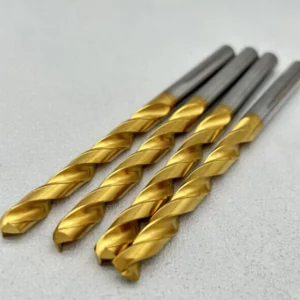Carbide drills for titanium play a pivotal role in enhancing efficiency and productivity in titanium work. As one of the most challenging materials to machine, titanium demands precision, durability, and performance from cutting tools. In this article, we delve into how carbide drills contribute to improving efficiency in titanium work, highlighting their unique features and advantages.
Carbide drills for titanium are engineered with specific properties tailored to tackle the demands of machining this tough material. Their composition, typically consisting of tungsten carbide and cobalt, renders them exceptionally hard and wear-resistant, essential qualities for prolonged tool life in titanium machining operations.
The superior hardness of carbide drills enables them to maintain sharp cutting edges even under extreme heat and pressure encountered during titanium machining. This attribute ensures consistent performance and minimizes the need for frequent tool changes, thereby reducing downtime and enhancing overall efficiency.
Moreover, the high thermal conductivity of carbide helps dissipate heat away from the cutting zone, preventing overheating and prolonging tool life. This thermal stability is crucial in titanium work, where excessive heat can lead to tool wear, workpiece deformation, and compromised surface finish.
Additionally, the geometry and design of carbide drills for titanium are optimized to deliver precise and efficient cutting action. Advanced flute designs, such as variable helix angles and chip breaker configurations, aid in chip evacuation and reduce the risk of chip buildup, thereby preventing tool jamming and ensuring uninterrupted machining processes.
Furthermore, the use of specialized coatings, such as titanium aluminum nitride (TiAlN) or titanium carbonitride (TiCN), enhances the performance and longevity of carbide drills in titanium work. These coatings provide additional lubricity and wear resistance, further reducing friction and improving chip flow, resulting in smoother cutting operations and higher machining speeds.
In high-speed machining of titanium, where productivity is paramount, carbide drills excel due to their ability to withstand elevated cutting speeds and feed rates. Their inherent rigidity and stability allow for aggressive machining parameters, leading to shorter cycle times and increased throughput.
Moreover, the versatility of carbide drills for titanium extends to a wide range of machining applications, including drilling, milling, and reaming. This versatility minimizes the need for multiple tool changes and setups, streamlining the machining process and enhancing overall workflow efficiency.
In conclusion, carbide drills for titanium play a crucial role in improving efficiency and productivity in titanium work. Their exceptional hardness, thermal stability, precise geometry, and specialized coatings make them indispensable tools for tackling the challenges of machining titanium. By investing in high-quality carbide drills engineered specifically for titanium applications, manufacturers can optimize their machining processes, reduce costs, and achieve superior results in their titanium machining operations.
